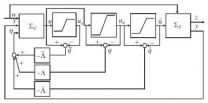(Press-News.org) Researchers have defined the gene responsible for a rare developmental disorder in children. The team showed that rare variation in a gene involved in brain development causes the disorder. This is the first time that this gene, UBE3B, has been linked to a disease.
By using a combination of research in mice and sequencing the DNA of four patients with the disorder, the team showed that disruption of this gene causes symptoms including brain abnormalities and reduced growth, highlighting the power of mouse models for understanding the biology behind rare diseases.
"Ubiquitination, the biological pathway UBE3B is involved in, is crucial in neurodevelopment," says Dr Guntram Borck, lead author from the University of Ulm. "We have studied several patients with this rare condition, and by sequencing the coding regions of the genome of these patients we found mutations implicating the gene UBE3B. This result was confirmed by studies performed in mice by our collaborators at the Sanger Institute.
At the Sanger researchers deleted the gene in mice and found that they had symptoms that were quite similar to those in the patients with UBE3B mutations including; reduced body weight and size, and reduced size of the brain.
The studies in mice also uncovered other defects underlying the disorder. Mice with the gene deletion had reduced cholesterol levels, a symptom that was seen by the team in three of the patients. This observation suggests that a defect in cholesterol metabolism is associated with this syndrome.
"Both techniques, DNA sequencing and deleting the gene in mice, support the finding that disruption of UBE3B causes this syndrome," says Dr David Adams, lead author from the Wellcome Trust Sanger Institute. "We can now learn much more about this syndrome by studying these mice. They also represent a pre-clinical model in which we may trial potential new therapies.
"This is the first time that this gene has been implicated in any disorder."
DNA sequencing has greatly improved the identification of variants associated with developmental disorders. But the challenge still remains for researchers to identify which of these variants, there are usually several hundred identified in each patient, cause the disorder. Animal models are a complementary approach for determining the causal gene and for understanding the biology behind genetic disorders..
"The syndromes we are studying, although rare, tell us a huge amount about biology," says Dr Helen Firth, Consultant Clinical Geneticist at Cambridge Universities Hospital Trust. "Understanding the biology behind these disorders could improve our management of these rare conditions and provide new avenues of research into treatments for scientists to pursue."
###
Notes to Editors
Publication Details
Lina Basel-Vanagaite, Bruno Dallapiccola, Ramiro Ramirez-Solis et al (2012) 'Deficiency for the Ubiquitin Ligase UBE3B in a Blepharophimosis-Ptosis-Intellectual Disability Syndrome'
Published online in American Journal of Human Genetics on 29 Nov.
Doi: 10.1016/j.ajhg.2012.10.011.
Funding
This work was supported by the Deutsche Forschungsgemeinschaft, the Rubicon European
Union Network of Excellence, the Israeli Ministry of Health Chief Scientist Foundation and the Israeli Science Foundation , the Wellcome Trust, the MRC and the EC
Participating Centres
A full list of participating centres can be found in the paper
Selected Websites
The Wellcome Trust Sanger Institute is one of the world's leading genome centres. Through its ability to conduct research at scale, it is able to engage in bold and long-term exploratory projects that are designed to influence and empower medical science globally. Institute research findings, generated through its own research programmes and through its leading role in international consortia, are being used to develop new diagnostics and treatments for human disease.
http://www.sanger.ac.uk
The Wellcome Trust is a global charitable foundation dedicated to achieving extraordinary improvements in human and animal health. We support the brightest minds in biomedical research and the medical humanities. Our breadth of support includes public engagement, education and the application of research to improve health. We are independent of both political and commercial interests.
http://www.wellcome.ac.uk
Contact details
Don Powell Media Manager
Wellcome Trust Sanger Institute
Hinxton, Cambridge, CB10 1SA, UK
Tel +44 (0)1223 496 928
Mobile +44 (0)7753 7753 97
Email press.office@sanger.ac.uk
End of Notes to Editors
Biology behind brain development disorder
Studies in mice confirm that mutations in the gene, UBE3B, cause a rare genetic disorder in children
2012-11-29
ELSE PRESS RELEASES FROM THIS DATE:
When good service means bad behavior
2012-11-29
Economists and professionals praise the merits of competition, as it leads to lower prices and improvements in quality. But in the automobile smog-testing industry, competition can lead to corruption and even public health problems, according to research by USC Marshall School of Business Assistant Professor of Management Victor Bennett.
Bennett, along with colleagues Lamar Pierce of Washington University's Olin School of Business, Jason Snyder at the UCLA Anderson School of Management and Michael W. Toffel of Harvard Business School, found that the structure of the smog-testing ...
Study reinforces safety of whooping cough vaccine for older adults
2012-11-29
PASADENA, Calif., Nov. 29, 2012 – Immunizing older adults with the tetanus-diphtheria-acellular-pertussis vaccine (Tdap) to prevent pertussis (more commonly referred to as whooping cough) was found to be as safe as immunizing them with the tetanus and diphtheria (Td) vaccine, according to a study by Kaiser Permanente published in the journal Clinical Infectious Diseases.
Researchers examined the electronic health records of nearly 120,000 people ages 65 and older at seven U.S. health systems between Jan. 1, 2006 and Dec. 31, 2010. The study looked at a number of medical ...
A new anti-windup design paradigm for control systems with actuator saturation was developed
2012-11-29
Actuator saturation is ubiquitous in engineering systems. Anti-windup approach to dealing with actuator saturation has been receiving considerable attention from both the industry and the academic community during the past decades. Professor Zongli Lin and his student Xiongjun Wu developed a new anti-windup design paradigm that is capable of achieving significantly improved performances of the resulting closed-loop system. Their work, entitled "Design of multiple anti-windup loops for multiple activations," was published in SCIENCE CHINA Information Sciences, 55(9), 2012. ...
Method for accurate extraction of a target profile developed at Beijing Institute of Technology
2012-11-29
The detection and recognition of an object with small RCS, such as a stealth target, is the most difficult problem to solve for the modern radar system. Professor Hu Cheng and his group at Radar Research Lab, Beijing Institute of Technology set out to tackle this problem. After seven years of innovative research, they have developed a series of methods to detect, track and recognize some targets with small RCS. In particular, they proposed a novel imaging method based on the principle of shadow inverse synthetic aperture radar (SISAR) to extract the target profile accurately ...
Technology use in the classroom helps autistic children communicate
2012-11-29
The use of technology in the classroom is nothing new, but Topcliffe Primary School in Birmingham is breaking new ground by using technology to help pupils with autism communicate more effectively.
The school, which teaches around 30 children with various levels of autism, was one of four schools across UK, which participated in the ECHOES research project, jointly funded by the Economic and Social Research Council (ESRC) and the Engineering and Physical Science Research Council (EPSRC) from universities across the UK to explore how technology can make a difference in ...
Scientific advice to ensure the sustainability of shark populations in Ocean waters
2012-11-29
Together with the Basque R+D centre's researchers, the group of advisers is made up of researchers from the Spanish Institute of Oceanography (IEO), the French Institute for Exploration of the Sea (IFREMER), the French Institute for Research for Development (IRD),and the Portuguese Institute for Fisheries and Sea Research (IPIMAR).This work comes within the 'European Community's Action Plan on Sharks' which has funding from the European Commission's Directorate-General for Maritime Affairs and Fisheries, and is set to take 15 months.
Shark are caught with fishing gear ...
Next-generation treatments for Fragile X syndrome
2012-11-29
Philadelphia, PA, November 29, 2012 – A potential new therapeutic strategy for treating Fragile X syndrome is detailed in a new report appearing in the current issue of Biological Psychiatry, from researchers led by Dr. Lucia Ciranna at University of Catania in Italy.
Fragile X syndrome (FXS), the most common heritable form of autism and intellectual disability, is one of the most exciting areas in brain research at the moment.
A decade ago, Dr. Mark Bear and his colleagues discovered that an animal model for FXS was associated with a distinctive alteration in brain ...
Researchers create a fly to study how a normal cell turns cancerous
2012-11-29
The wing of a fruit fly may hold the key to unraveling the genetic and molecular events that transform a normal cell into a cancerous one. The study, conducted on Drosophila melanogaster by scientists at the Institute for Research in Biomedicine (IRB Barcelona) and led by ICREA researcher Marco Milán, has reproduced each of the steps known to take place when a healthy cell turns cancerous. The researchers have thus provided an inexpensive and effective model that will allow the scientific community to scrutinize the genes and molecules involved in each step. Given that ...
Homicide spreads like infectious disease
2012-11-29
EAST LANSING, Mich. — Homicide moves through a city in a process similar to infectious disease, according to a new study that may give police a new tool in tracking and ultimately preventing murders.
Using Newark, N.J., as a pilot case, a team of Michigan State University researchers led by April Zeoli successfully applied public health tracking methods to the city's 2,366 homicides between 1982 and 2008. They found the killings were not randomly located but instead followed a pattern, evolving from the city's center and moving southward and westward over time.
Like ...
Cancer drug shows promise in eradicating latent HIV infection
2012-11-29
Bethesda, MD—Breakthrough drugs have made it possible for people to live with HIV longer than ever before, but more work must be done to actually cure the disease. One of the challenges researchers face involves fully eradicating the virus when it is latent in the body. A new report appearing in the December 2012 issue of the Journal of Leukocyte Biology suggests that a cancer drug, called JQ1, may be useful in purging latent HIV infection by activating the virus in the presence of potent therapy – essentially a dead end for the virus.
"This drug may be useful as adjunctive ...
LAST 30 PRESS RELEASES:
Political polarization can spur CO2 emissions, stymie climate action
Researchers develop new strategy for improving inverted perovskite solar cells
Yes! The role of YAP and CTGF as potential therapeutic targets for preventing severe liver disease
Pancreatic cancer may begin hiding from the immune system earlier than we thought
Robotic wing inspired by nature delivers leap in underwater stability
A clinical reveals that aniridia causes a progressive loss of corneal sensitivity
Fossil amber reveals the secret lives of Cretaceous ants
Predicting extreme rainfall through novel spatial modeling
The Lancet: First-ever in-utero stem cell therapy for fetal spina bifida repair is safe, study finds
Nanoplastics can interact with Salmonella to affect food safety, study shows
Eric Moore, M.D., elected to Mayo Clinic Board of Trustees
NYU named “research powerhouse” in new analysis
New polymer materials may offer breakthrough solution for hard-to-remove PFAS in water
Biochar can either curb or boost greenhouse gas emissions depending on soil conditions, new study finds
Nanobiochar emerges as a next generation solution for cleaner water, healthier soils, and resilient ecosystems
Study finds more parents saying ‘No’ to vitamin K, putting babies’ brains at risk
Scientists develop new gut health measure that tracks disease
Rice gene discovery could cut fertiliser use while protecting yields
Jumping ‘DNA parasites’ linked to early stages of tumour formation
Ultra-sensitive CAR T cells provide potential strategy to treat solid tumors
Early Neanderthal-Human interbreeding was strongly sex biased
North American bird declines are widespread and accelerating in agricultural hotspots
Researchers recommend strategies for improved genetic privacy legislation
How birds achieve sweet success
More sensitive cell therapy may be a HIT against solid cancers
Scientists map how aging reshapes cells across the entire mammalian body
Hotspots of accelerated bird decline linked to agricultural activity
How ancient attraction shaped the human genome
NJIT faculty named Senior Members of the National Academy of Inventors
App aids substance use recovery in vulnerable populations
[Press-News.org] Biology behind brain development disorderStudies in mice confirm that mutations in the gene, UBE3B, cause a rare genetic disorder in children



